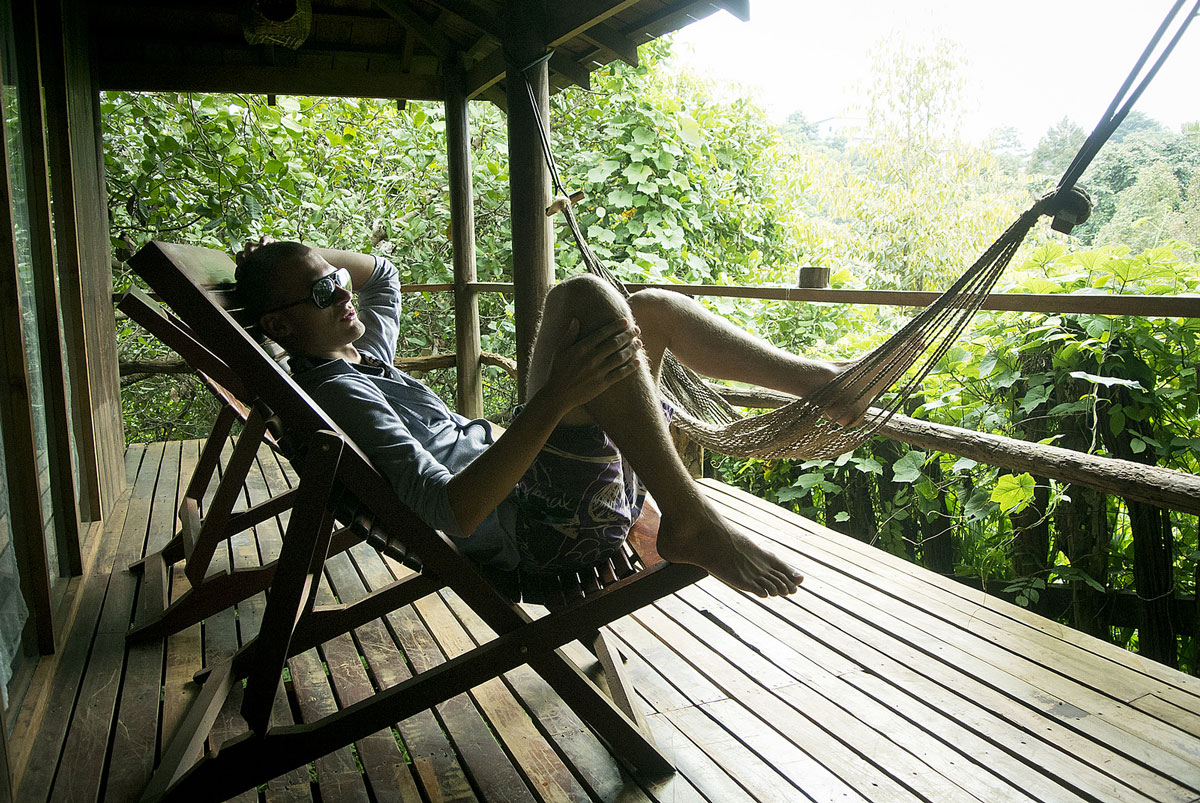In the months leading up to our departure, Sebastiaan and I managed to save a lot of our money for travel. But we didn’t just stop there–the more, the merrier, right? (In our case, anyway.)
In addition to the steps we took to save money, we also did small jobs to make more money for travel, planned on ways to save while abroad, and tweaked our lifestyles in a few ways ways to help us save that extra couple of bucks. Here’s a few of our tips and tricks to up your saving game, and help you find a bit of extra cash here and there.
1. Make money: do odd jobs, ideally on the interwebs.
There are tons of ways to make some extra money on the side. This ranges from watching your neighbors’ children/dog/pet tarantula, to doing online user tests. Here are some resources you might find useful:
- Usertesting.com is our favorite. All you have to do is record yourself talking about/reviewing websites and phone apps. Though getting the first few gigs takes a bit of vigilance, it’s freaking easy to do, pays well ($10-15 for 10 or so minutes of talking) and you receive money within 1 week to a PayPal account.
- Fiver.com is a place for people to find odd small jobs that can usually be done over the internet.
- r/beermoney is a subreddit filled with all kinds of interesting suggestions on how to make an extra couple of bucks here and there.
- Craigslist sometimes has interesting job posts and one-off requests for help. Be careful not to be scammed, though.
The amounts you make for these jobs are peanuts by themselves, but over a longer period of time, they start to add up. Think of each gig as an extra night of accommodation when backpacking on a budget! Or an extra couple of beers. Or a delicious dinner. Or… well, you get the idea.
2. Save money: if you must drink, do as the hobos do.
Many people recommend giving up drinking and going out when saving, and for good reason. Going out for a night of drinking is like tossing your wallet into a black hole of sloppy intoxicated doom. Drinks quickly suck out any savings you may have amassed, and if the drinks don’t get you, that unnecessary pizza (or three) afterwards will.
… HOWEVER, I am of the opinion that you should not subject yourself to Puritanical misery for months on end for the sake of saving. Happiness is key to success, and that applies to successfully saving as well!
(Also, I like drinking.)

We saved money on New Years by just drinking on the streets (…with explosives). Protip: walking around while drinking is usually much more entertaining than just drinking in a bar/club. Just sayin’.
If you’re going out somewhere with drinks, try to stick to drinks from the supermarket/alcohol store. Channel your collegiate self and “pregame” as much as possible before heading out to expensive bars or venues. Be that person that sneaks in flasks all the time. People may judge you, but you can laugh at them later on when they’ve spent over a hundred on mix drinks for the night and you’re still working away at your $5 vodka bucket on an island in Thailand somewhere.
As for the drunken post-party pizzas, just mooch bites from everyone else’s pizza. It’s good for your health and your wallet… though perhaps not so healthy for your friendships.
3. Save money: go to free events.
There are always free events, if you know where to look. Try checking out things like meetup.com or various Facebook groups. For example, in Amsterdam you can check out the page of Free events in Amsterdam.

SAIL in Amsterdam was a super cool free event revolving around several days of big, badass sailboats.
Not so many free events in your area? Remember that there’s a super awesome place called THE OUTDOORS! Chilling outside and doing things in the outdoors is (usually) free, and good for your soul/health.
Instead of going out to lunch, go on a picnic. Instead of going shopping, go walking or hiking. Chill in a park with your homies instead of going somewhere where you have to pay to get in. It can sometimes be a bit difficult to do this in really cold or really wet (coughNetherlandscough) places, but if you wait long enough, there’s gotta be good weather eventually, right?
4. Save money: eat with friends, family (…at their expense, where possible).
Our apartment was a five minute walk from Sebastiaan’s parents’ house. Barging in unexpectedly once or twice a week around dinner time will definitely save some grocery expenses. It helps if the food is actually good (which it was).
With friends this is a bit trickier, but eating together means splitting the costs together (especially when you’re Dutch, apparently), which means a lower food bill. Suggest staying in and cooking meals together, rather than going out for dinners. It’s just as fun, and half of the cost.
5. Make and/or save money: Sub-rent your house/apartment
This option isn’t possible for everyone. But even if you’re renting, you can sublet your apartment for the time you are gone. Make sure to discuss with your landlord, and check your country specific rules about subletting. Also make sure not to sublet/rent your apartment out to crack heads, whack jobs, or anyone who could cause problems that you can’t resolve while you’re away. You can either do this directly through your landlord, use an estate agent, use social media, or use websites such as Airbnb.
We don’t do this (we actually gave up our apartment, and are quite literally, homeless), but for some people this could be a great way to generate extra income, or nullify the costs you make while abroad.
6. Make and/or save money: Work or volunteer along the way.
There are many destinations where you can combine work with travel, or volunteer to save money. From harvesting grapes in Australia, to teaching English in South America, there are tons of opportunities. Some are paid, some are on a volunteer basis, all will let you extent your travel plans. Here are some resources you might find useful:
- Workaway provides a listing of low-skilled jobs in countries all over the world.
- TEFL academy is the course we took to become TEFL certified to teach English anywhere in the world. The classroom course was very good, and the course itself was quite cheap.
- Dave’s ESL Cafe is a great place to find English teaching jobs abroad.
- Trusted Housesitters is a place where you can sign up to watch over people’s houses while their owners are on holiday. Most of the time, it involves watching over their pets as well. It’s a great way to save money and get to live in a nice house for a little bit longer.
- Crewbay is a website for people looking to find work on boats/yachts (pimping, right?)
- Working Nomads is a great resource for finding jobs you can do from anywhere, especially if you’re a designer or a software developer.
7. Hard mode: invest your money.
Sebastiaan: This option is not for everyone, and I hesitate to bring it up. However, part of this trip was made possible by my doubling part of my savings in half a year. If you choose this option, there are some things to consider:
Can I lose this money?
Whenever you invest your money, you run the risk of losing it. You should therefore never invest money that you absolutely, positively will need at some point. If I had lost all the money I invested, I would still have been able to travel, just for a shorter time. If you choose to invest, don’t invest all your savings.
Do I have enough time to make a meaningful return?
I doubled my money in about six months. I was willing, however, to have this money invested for more than a year–I was just lucky with my timing. Make sure to think in terms of time. If you are leaving in three months, and need this money by then, you probably shouldn’t invest it. It is not likely you will make a meaningful returns in three months. Always ask yourself if your time frame is long enough to make meaningful returns.
Do I have a strategy?
Just throwing money at the stock market can work in the short term. In general, if you don’t know what you invest in or what you are doing, you will lose money. Think about what you’re doing before you start buying up stocks! Writing out strategies here will probably get too boring and too long for most of you. Let me just say that I am in favor of a buy-and-hold strategy with a time horizon of at least a year.
What type of product do I want to invest in?
There are a myriad of investment products out there. Stocks, trackers, options, bonds, and turbos, to name a few. Each of these come with its own risk profile: bonds are low(er) risk, and options, turbos and other derivatives are high risk, with bigger returns. I started out with turbos, but now only have stock. It is important to understand the risk profile of your potential investment, and to understand how the type of product you want to invest in, is priced.
Remember, there is always risk involved with investing.
You can lose money. Even if you picked a winning company that does well, bad overall market sentiment can lower its value. There is always risk involved–people that pander risk-free investments are trying to scam you. The opposite site of this coin is reward. You have the potential to make a better return on your money when investing it, compared to putting this money in a savings account (according to financial theory, you are currently losing money by doing this, because the interest you get is less than inflation). You should always keep this in mind, and never pursue this option if you are not comfortable with the involved risks.
There are tons of other variables to take into consideration, and you will never truly know all there is to know. But, you can always start! Seeking Alpha is a good place to start if you’re looking to start reading up on investing. I have only included this section because of my own interest and experience, and urge you to tread with caution if you choose this option. If you want to know more or just talk strategy and whatnot, you can always contact us.
What have you done to make a couple extra bills or save more money for travel?



you left out begging 🙂
We tried that do a bit, to no avail 😉